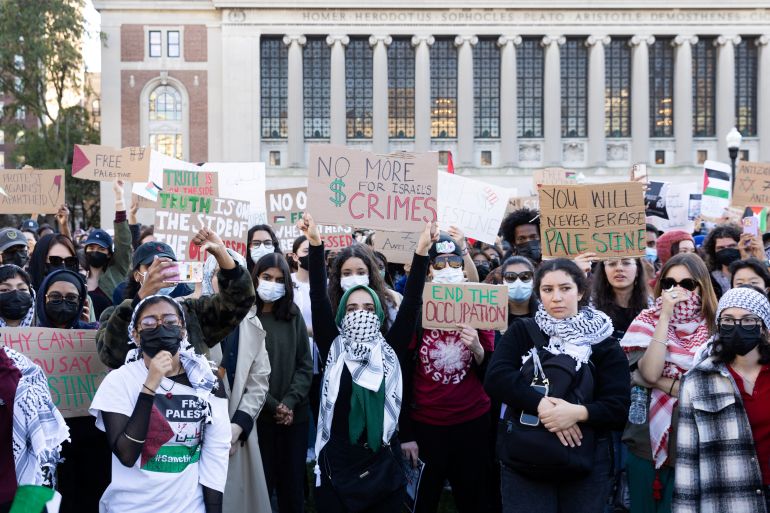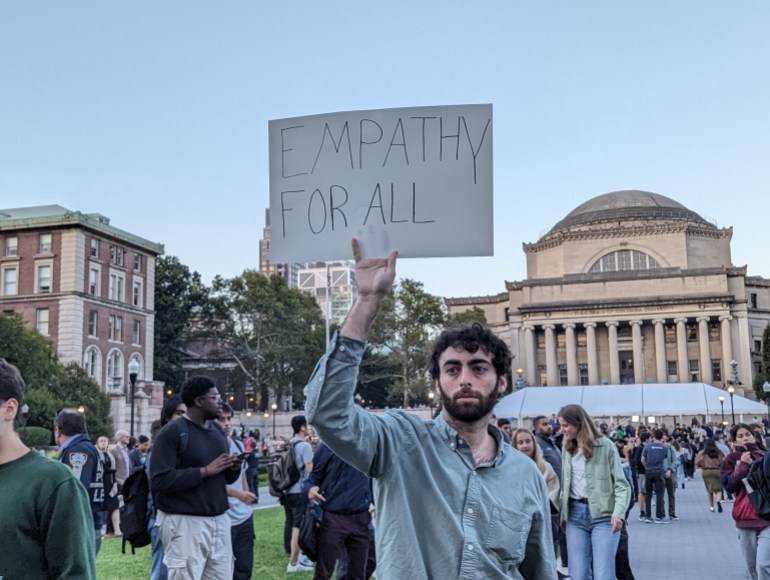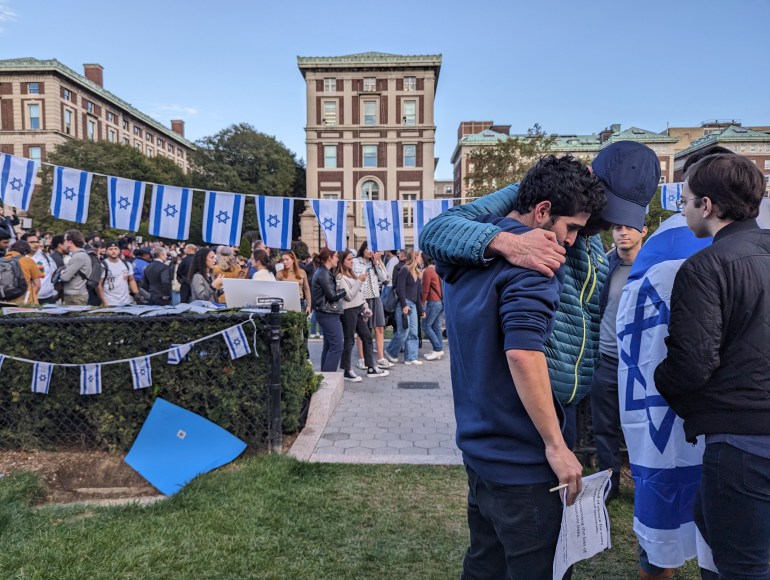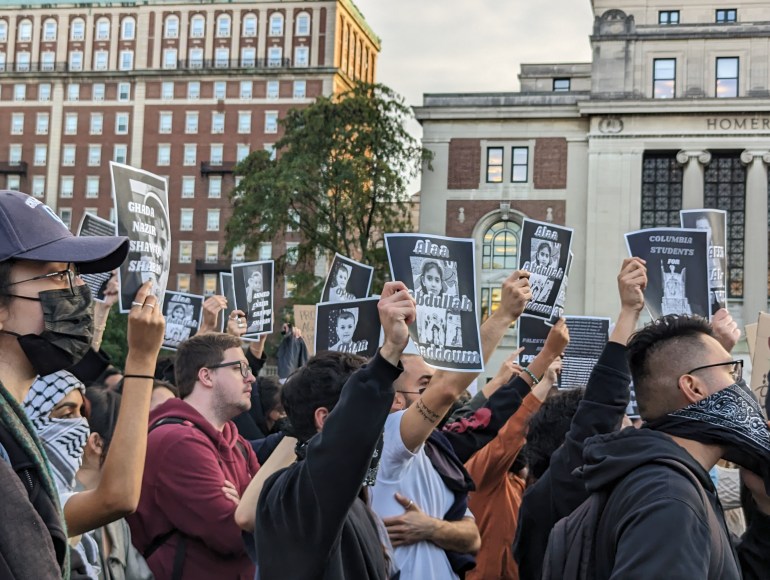Tensions surge at US universities as students rally over Israel-Hamas war
Pro-Palestinian and Pro-Israel protests have come head to head on some campuses, raising concerns over student safety.

New York City, United States – It was an unprecedented scene. Columbia University, located in the heart of Manhattan, took the extraordinary move of closing its doors to the public last week as dueling protests erupted simultaneously on its lawn.
Hundreds of protesters, representing pro-Palestinian and pro-Israeli student groups, clashed in front of the stately colonnade of Butler Library on October 12. Three helicopters hovered overhead, and rows of New York Police Department officers stood ready to intervene if tensions boiled over into violence.
Keep reading
list of 3 items‘Fantasy land’: How Biden’s normalisation drive ignored Palestinians
White House walks back Biden’s claim he saw children beheaded by Hamas
But Columbia was hardly the only school in the United States to convulse with demonstrations during the past week.
Since the Palestinian group Hamas launched a surprise attack on Israel — and Israel responded with a declaration of war — tensions in the Middle East have been reflected on college and university campuses, traditional hotbeds for activism in the US.
Student-led rallies have exploded from coast to coast. In the west, the University of California at Berkeley issued a statement decrying the “growing prevalence of online threats, doxxing and harassment”. And in the east, emotions were so high at a University of Florida prayer vigil that when a participant reportedly fainted, the crowd screamed and panicked, injuring five in a stampede.
But when it comes to student safety, some protest participants say universities are falling short.
“I’ve had multiple people tell me, like, to go f*** myself or go f***ing die,” one Arab-American graduate student at Harvard University told Al Jazeera on condition of anonymity.
She said she has noticed an uptick in harassment against Arab and Muslim students since the start of the Israel-Hamas war.
“There have been a number of times I have to think about how I’m going to get home or how I’m going to walk alone. It’s genuinely not OK to face this level of Islamophobia,” she said.

At Columbia, a board member for the Students for Justice in Palestine (SJP) — one of the groups behind the October 12 protest — also told Al Jazeera that classmates organising with Jewish Voice for Peace were spat upon by fellow students.
“It’s not just any one group,” the board member, who asked not to be identified due to safety concerns, said of those being targetted by the harassment.
“It’s Jewish students. It’s Muslim students. It’s Palestinian students. It’s Black students. Mostly it’s been students of colour. And we don’t know what to do about this.”
Another SJP board member echoed those sentiments, saying the situation was especially dire for Muslim students. “Their security is threatened on campus right now,” the second member said.
Those fears have put school administrators in a bind, with security restrictions sometimes going head-to-head with long-cherished ideals like free speech and open campuses.
“Our University has always stood as a beacon of free expression and open dialogue, promoting a diverse and inclusive community where ideas and opinions can be freely exchanged,” Columbia University said in a statement this month.
“However, it is crucial to emphasize that with this freedom comes the responsibility to ensure that our campus remains safe.”
That is why the school limited access to the October 12 protests to holders of campus identification cards, the statement said. Columbia had received reports that some protest organisers had attempted to “enlist the participation of outside supporters”, fuelling the risk for an “unsafe environment”.

Nevertheless, New York resident Amira E — who withheld her last name for fear of backlash — joined a pro-Palestine protest outside of Columbia’s gates.
She explained that her goal was to spur dialogue and raise awareness for the Palestinian civilians caught in the war’s crossfire. Nearly 3,000 Palestinians have been killed since Israel declared war on October 8, in addition to the estimated 1,400 Israelis killed by Hamas.
“I’m just trying to have productive conversations with people who are not with the Palestinian cause,” Amira told Al Jazeera. “The thing is, the protesters there with the Israeli flags also don’t want innocent people to die either. Nobody wants that.”
But the presence of other outside entities — namely, the media — caused discomfort among some protesters.
One of the SJP board members blasted Columbia’s decision to allow a limited number of journalists on campus during the demonstrations.
“This exposed these vulnerable students to national media without any warning,” the board member said. “We’re just students at the end of the day, and now we’re getting reports of death threats. We’re getting death threats to our email, to our Instagram every single day.”
Some students rallying on behalf of pro-Palestinian groups covered their faces with sunglasses, masks and keffiyehs, a traditional Middle Eastern scarf.
The protests were linked to at least one alleged attack. In the lead-up to the duelling demonstrations, a 24-year-old student was reportedly beaten with a stick while pasting pro-Israel posters near the library. A 19-year-old suspect was taken into custody.

Daniel Katz, an Israeli student and freshman at Columbia, said he was taken aback by pro-Palestinian chants during the protest like, “From the river to the sea, Palestine should be free.”
“I live in Israel. When they say ‘from the river to sea’, that intersects in my house. Where am I supposed to go?” Katz asked. He called the chants “genocidal”.
Another Jewish campus member, business school professor Shai Davidai, objected to Columbia allowing what he considered “pro-Hamas” groups to demonstrate.
“We’re here to say that allowing the university to have a pro-Hamas rally is horrific,” he said as he stood with the pro-Israel protesters, holding up the picture of a child believed to be among the captives held by Hamas.
Davidai said he hoped to push Columbia to condemn such rallies by taking aim at one of its main funding sources: donations.
Columbia estimates that approximately 12 percent of its annual budget comes from a donor-supported endowment. And in June 2022, its board of trustees reported more than $535.4m in private gifts, grants and contracts.
That reliance on donations leaves Columbia and other universities in a vulnerable position, potentially setting up a conflict between academic freedom and the will of donors.
Already, former US Ambassador Jon Huntsman has said in a letter that he would end donations to his alma mater, the University of Pennsylvania, for not taking a strong enough stance against Hamas.
“Silence is antisemitism, and antisemitism is hate, the very thing higher ed was built to obviate,” Huntsman wrote.
Davidai said he, too, would push donors to cut funding to Columbia.
“You cannot give money to the university when the university allows that,” he said of some of the protests. “I’m calling every donor of the university, even if that means they cut my salary in half or 80 percent and we can’t fund anything.”